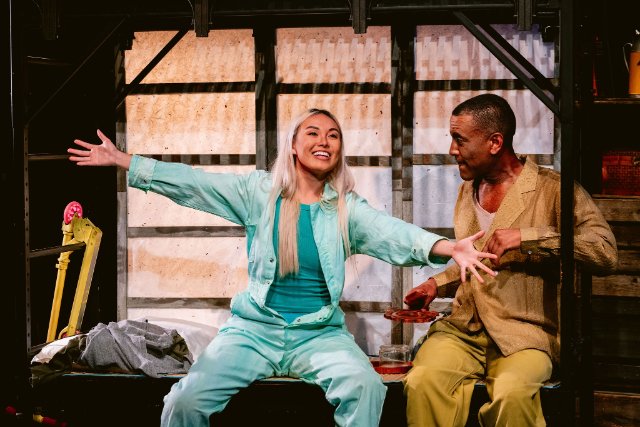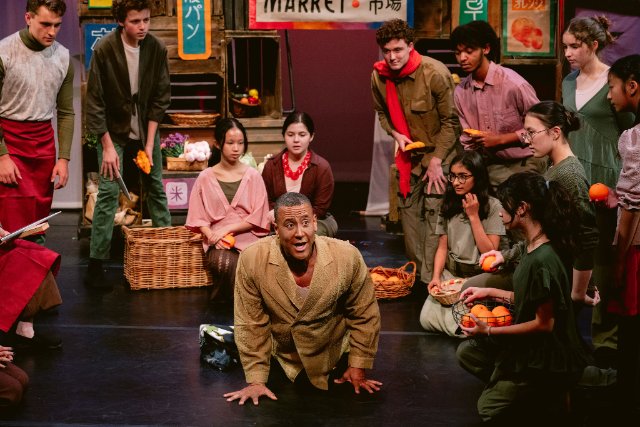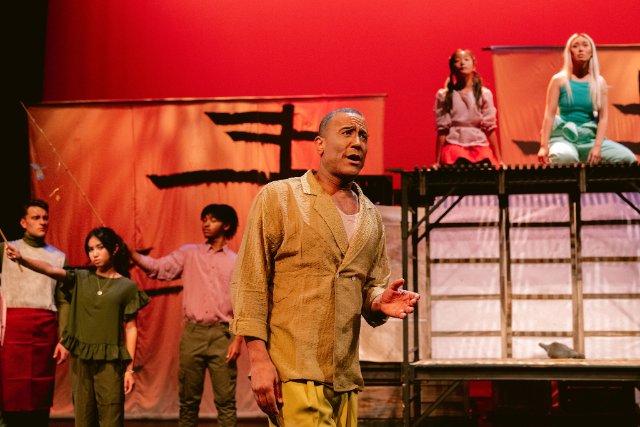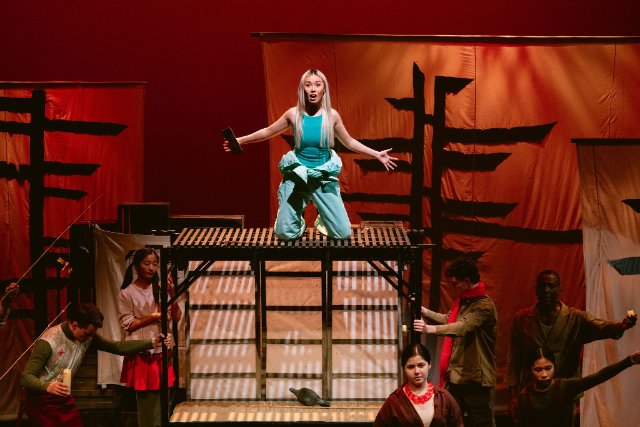The Emissary
Opera Parallele's World Premiere of Hands-On-Opera With Environmental Focus
By: Victor Cordell - Oct 28, 2023
Record temperatures and climactic events of greater frequency and intensity. Depleted fisheries, polluted waters, and rising sea levels. Human errors in nuclear disasters. This is but the beginning of the environmental degradation wrought by humankind’s poor stewardship of its home.
Opera Parallèle’s unique and forward-looking Hands-On-Opera contributes to the growth of new audiences and new sources for opera by commissioning operas that cast children and are written by composers who are fresh to the idiom, bringing new musical styles and approaches. The company’s most recent project is the provocative and entertaining world premiere of the one-act opera “The Emissary,” which takes place in a dystopian future in Japan marred by a disaster broadly reminiscent of the Fukushima nuclear disaster. Japan has returned to isolationism, and children are more frail and aged than their elders.
Composer Kenji Oh was engaged to produce a piece that addresses environmental concerns, and his choice takes place in the country of his birth, a fiction written by Yoko Tawada. Having no prior experience in opera, Oh’s musical palette in representing the story is eclectic. He has written classical music for orchestral and choral performance, but he also draws on his own musical modes used in composing for films as well as Japanese folk music themes.
The chamber orchestra, conducted briskly by Nicole Paiement, comprises six instrumentalists. They produce a mellifluous sound that is often in a punctuated fashion except for the occasional hissing of brushes and languid lushness of the violin.
With only 50 minutes to work with, the storyline is brief. The versatile and experienced Kelley Roarke has produced the libretto which induces the emotional response to the tragedy of human and environmental decline. To fully understand the story, however, does require information from outside of the opera. Roarke’s account calls for two prime time singers, the first of which is an old man Yoshiro, performed by Bradley Kynard. After many years as a chorister with San Francisco Opera, the sonorous and expressive baritone is adeptly playing principal roles on smaller stages. He excels as the sympathetic, loving caregiver.
Yoshiro’s mission is caring for his great-grandson Mumei, who, despite his affliction and sad prognosis, brings cheer and optimism to life, which keeps the narrative from being too depressing. The role is written in the soprano range, which would be appropriate for a young boy. But in an interesting conceit, not only is the role portrayed by an adult female, but there is no effort to make her look like a boy.
Angela Yam is Mumei, and she mimics the deception admirably, with the posturing of a child. Her vocal role calls for some ascent into her upper range, and she demonstrates dramatic power and command. Interestingly, while Oh’s score provides operatic-like singing challenge for the Mumei role, the baritone doesn’t have as much opportunity to stretch his skills.
In addition to the two leads, several supporting characters are sung by youths. A chorus with members from the Lick Wilmerding High School Chorus is often present, and some even have brief solos to add to their resumés.
While the title relates to a group that illegally sends young people abroad to share the story of Japan’s despair, it really centers on mortality and appreciating the small things in life. For instance, since they are unable to trade with the outside world, the purchase of oranges is limited to one per customer, and shrimp are totally unavailable.
In chilling commentary on the frightening and deceitful communication of today in the United States, euphemisms try to hide realities in the opera. Notably, the word mutation is not to be used, but rather, environmental adaptation. Disappearances are covered as “special circumstances.” And fake news permeates everything. In this telling, the islands of Japan have been further separated from mainland Asia as a result of earthquakes, but opportunists have no compunctions in depicting the event as caused by socio-political factors.
“The Emissary” is a meaningful, attractive, and easily digestible diversion that in its present form offers a great opportunity for school performance , especially because of the breadth of chorus involvement and the chance for many to shine individually with their 15 seconds of fame. It also has an appealing core of music, drama, and message that could be the basis for a more significant chamber opera.
“The Emissary” is a world premiere composed by Kenji Oh with libretto by Kelley Roarke, based on a novel by Yoko Tawada, translated by Margaret Mitsutani, produced by Opera Parallèle, and plays at ODC Theater, 3153 17th Street, San Francisco, CA through October 28, 2023.





